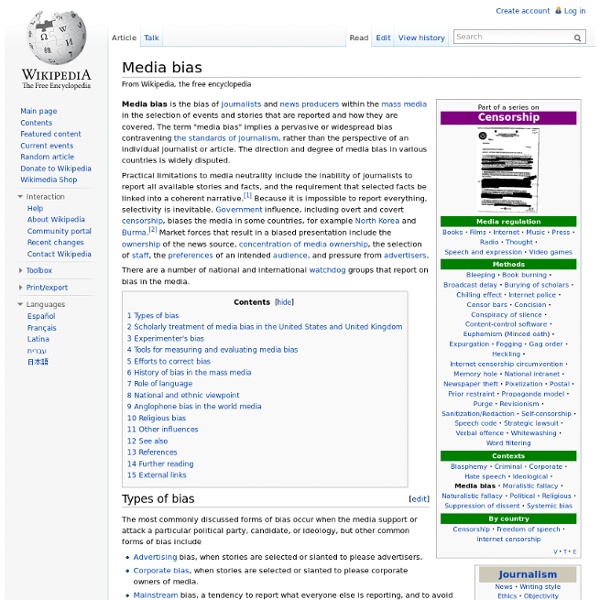Media bias
Media bias is the bias or perceived bias of journalists and news producers within the mass media in the selection of events and stories that are reported and how they are covered. The term "media bias" implies a pervasive or widespread bias contravening the standards of journalism, rather than the perspective of an individual journalist or article. The direction and degree of media bias in various countries is widely disputed. Practical limitations to media neutrality include the inability of journalists to report all available stories and facts, and the requirement that selected facts be linked into a coherent narrative.[1] Government influence, including overt and covert censorship, biases the media in some countries, for example North Korea and Burma.[2] Market forces that result in a biased presentation include the ownership of the news source, concentration of media ownership, the selection of staff, the preferences of an intended audience, and pressure from advertisers.
Journalism ethics and standards
Journalism ethics and standards comprise principles of ethics and of good practice as applicable to the specific challenges faced by journalists. Historically and currently, this subset of media ethics is widely known to journalists as their professional "code of ethics" or the "canons of journalism".[1] The basic codes and canons commonly appear in statements drafted by both professional journalism associations and individual print, broadcast, and online news organizations. Evolution and purpose of codes of journalism[edit] The principles of Journalistic codes of ethics are designed as guides through numerous difficulties, such as conflicts of interest, to assist journalists in dealing with ethical dilemmas. The codes and canons provide journalists a framework for self-monitoring and self-correction. Codes of practice[edit] One of the leading voices in the U.S. on the subject of Journalistic Standards and Ethics is the Society of Professional Journalists. Common elements[edit]
SPJ Works » Blog Archive » Big hashtags for journalists
Twitter is an exciting place for new and seasoned journalism professionals to come together and share ideas and opportunities. One key to optimizing your Twitter experience is to take advantage of its hashtag resource, which links related topics together with a simple # at the beginning of a word, acronym or phrase. Over the past few weeks, I’ve researched some of the most frequently used journalism-related hashtags and their benefits. For new tweeters out there, or those still thinking about using Twitter, I hope you’ll take advantage of these hashtags for journalists and all those interested in such topics. Leave a comment below and tell us what journalism-related hashtags you like to use. Most Common:#journalism – Obviously one of the most encompassing journalism-related tags, it is the most used and is great for mixed industry-related posts. AP Style:#apstyle – For talking about thoughts and trends related to the Associated Press Stylebook.
HOW TO: Beat Writer's Block Online
Nowadays, we are all content creators. Whether it's work or a school project, the next blog post, or even that next tweet, we all suffer from writer's block from time to time. Traditional advice suggests taking a break from your monitor and getting some fresh air. That's great old school advice, but it isn't a useful suggestion for anyone tied to their computer. We've pulled together some top ideas, tools and services for beating writer's block in an online environment, so you can break through that barrier without leaving your desk. Have a read below for our quick tips to help you beat writer's block online and let us know in the comments about any methods that have worked for you. 1. Staring at your choice of word processing program is not likely to inspire you. Alternatively, music can help with creativity, but don't just hit play on the usual suspects. Images can also trigger a creative response. 2. 3. 4. 5. Two brains are better than one. More Productivity Resources from Mashable:
Related:
Related:



